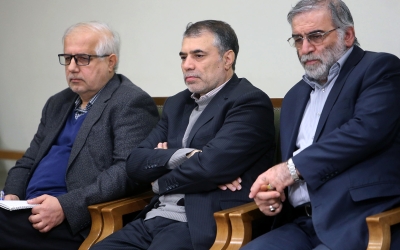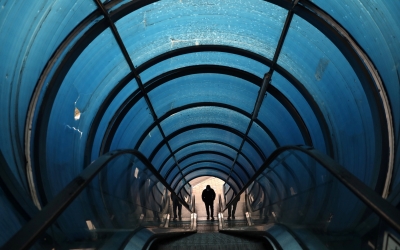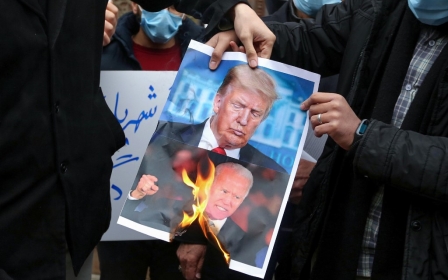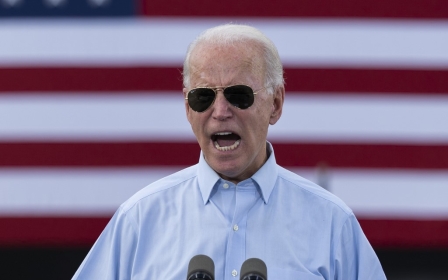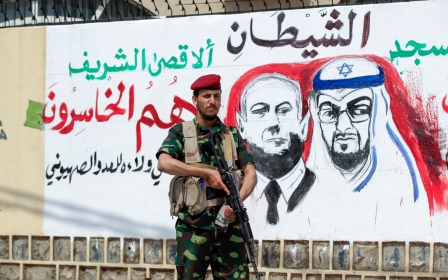Iranian press review: Tehran talking to Biden's foreign policy team
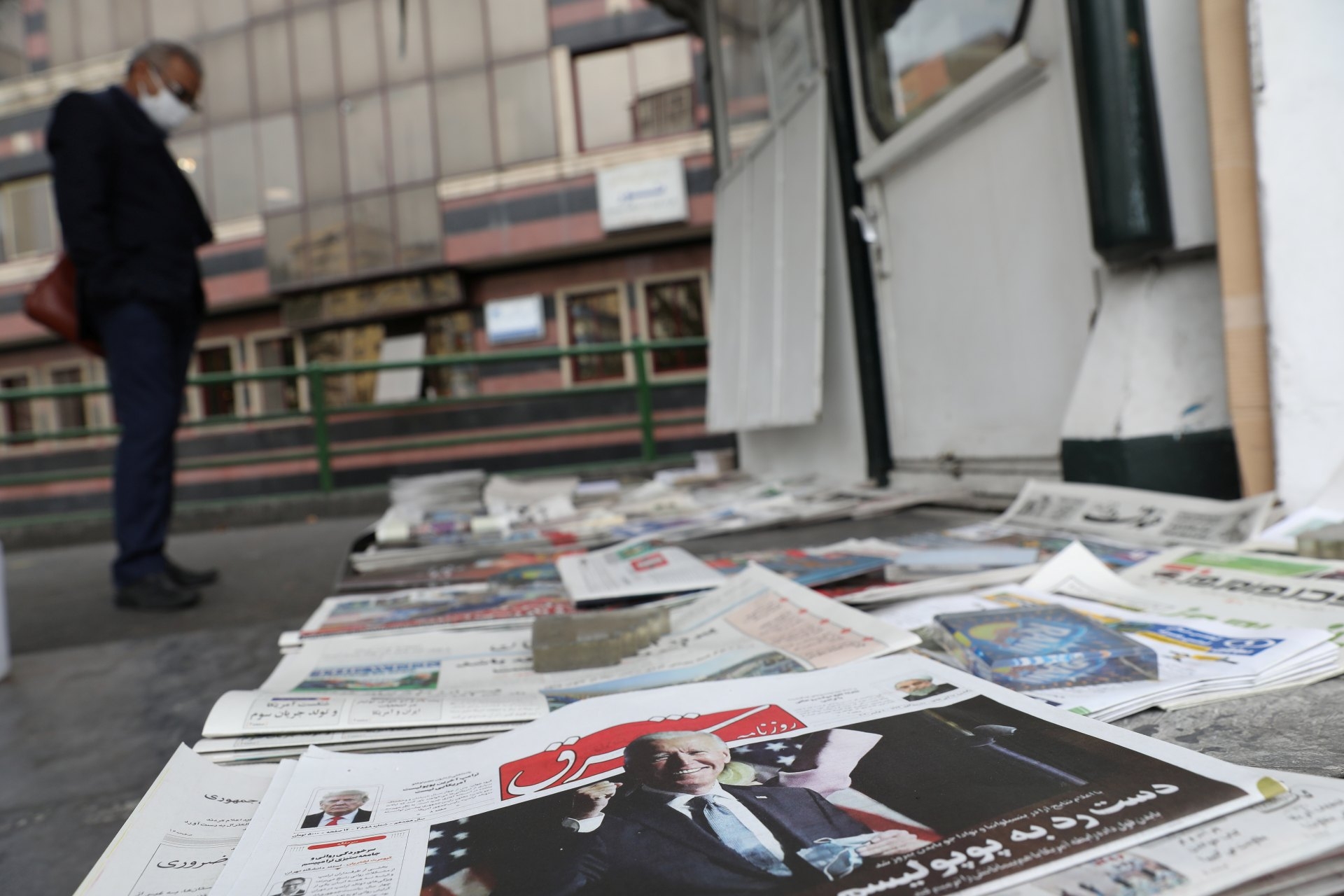
Tehran talking to Biden foreign team: Sources
The Sedai-e Eslahat daily, the official paper of Hezbe Mardomie Eslahat (People’s Reformist Party), has reported that Iran’s foreign ministry has begun a round of secret negotiations with President-elect Joe Biden’s foreign policy team.
The daily did not elaborate further on the time and place of talks, nor the topics which were discussed in the negotiations.
“Recently some sources have revealed that {Mohammad Javad] Zarif and members of the next government of the US have made contacts,” the daily said, referring to Iran’s foreign minister.
“It is also said that Zarif deputy Abbas Araghchi has already begun negotiations with the European signatories of the 2015 nuclear deal and the US next government.”
New MEE newsletter: Jerusalem Dispatch
Sign up to get the latest insights and analysis on Israel-Palestine, alongside Turkey Unpacked and other MEE newsletters
Speculation about secret talks between Washington and Tehran has risen following an interview with Zarif in which he said that he has known Biden for 30 years.
Officials and rival political factions in Tehran hope the next US government will halt Trump’s maximum pressure campaign against Iran and return to the Obama-era nuclear deal.
‘Don’t fall into Israel’s trap’, reformists warn officials
Iranian foreign policy analysts and reformist politicians have warned President Hassan Rouhani and conservative legislators not to fall into Israel’s trap of triggering a fresh military confrontation between Tehran and Washington.
Following the assassination last month of Mohsen Fakhrizadeh, Iran’s top nuclear scientist, Tehran blamed the attack on Israel and the United States, vowing to revenge his death.
On Tuesday, the Iranian parliament, which is controlled by conservatives, passed a bill that will limit Iran’s collaboration with the International Atomic Energy Agency (IAEA). The bill was approved by the country’s Guardian Council on Wednesday.
Legislators and the Atomic Energy Organization of Iran have accused the IAEA of sharing details of Iran’s nuclear activities with the American and Israeli intelligence services.
Meanwhile, foreign policy analysts in Tehran have advised the Rouhani administration and parliament to avoid any move that would escalate tensions between Iran and the US during President Donald Trump’s final two months in office.
In a piece for the Ebtekar daily, foreign policy analyst Jalal Khoshchehreh said Fakhrizadeh’s killing was a plot to push Iranian politicians into making emotional decisions against the country’s national interests.
“The enemies of Iran are impatient to shut all doors to diplomacy, which could possibly put an end to three years of the maximum pressure campaign against Iran,” Khoshchehreh wrote, referring to Trump’s sanctions-heavy anti-Iran strategy.
In a statement, which has gone viral on social media, a group of former politicians, student activists and political prisoners warned Rouhani that the latest assassination of a scientist is a trap designed by Israel to “ignite the fire of war” in a time that Iran is getting closer to removing US sanctions.
In an editorial for the Arman Daily, former lawmaker Mohammad-Reza Khabbaz wrote that the parliament’s new bill would add to Tehran’s struggles to remove Trump’s devastating sanctions and to find alternatives to tackle the country’s economic crisis.
“It’s not difficult to be all talk and just shout slogans, everyone can do that,” Khabbaz wrote, referring to legislators who have said the bill would oblige Rouhani to find innovative ways to alleviate economic woes, rather than seek sanctions relief.
“Your election campaign slogans were focused on solving Iran’s economic problems, but since you have realized that you can’t do that, you are exerting pressure on the government. This would not solve the problem … and it would be better if you help to solve the issues instead of adding to those.”
Black market for coronavirus care emerges
Iranian media has reported that a new black market has been created for Covid-19 medical supplies and private care at homes and hospitals for the patients who have contracted the virus.
Minoo Mohraz, a specialist in infectious diseases and member of Iran’s national coronavirus task force, told the country’s official news agency IRNA that Iran’s generic version of remdesivir antiviral medicine is being sold on the black market while the producers were only permitted to supply hospitals with this drug.
According to Mohraz, the actual price of Iranian remdesivir is about 30m Iranian rials ($700), however, on the black market the medicine is sold for between 200m and 400m rials ($4800-$9600).
“Two pharmaceutical factories produce remdesivir in the country, but they can only distribute the medicine among the hospitals,” IRNA quoted Mohraz as saying.
“It should be found out how this drug is now available on the black market.”
Meanwhile, the Shahrvand daily has reported that the number of companies offering private care for Covid-19 patients has mushroomed across the country in recent months.
According to the daily, in Tehran the price of 24-hour care at home is 5,200,000 rials ($124) and for 12-hours of care they charge their clients 2,800,000 rials ($67).
Iran is the hardest hit country in the Middle East by coronavirus, and on 21 November authorities imposed nationwide curbs on traveling between cities and ordered non-essential businesses to shut down.
According to official figures, by Wednesday Iran’s total death toll stood at 48,990 while the number of cases was at 989,572.
*The Iranian press review is a digest of reports that are not independently verified as accurate by Middle East Eye
Middle East Eye delivers independent and unrivalled coverage and analysis of the Middle East, North Africa and beyond. To learn more about republishing this content and the associated fees, please fill out this form. More about MEE can be found here.


